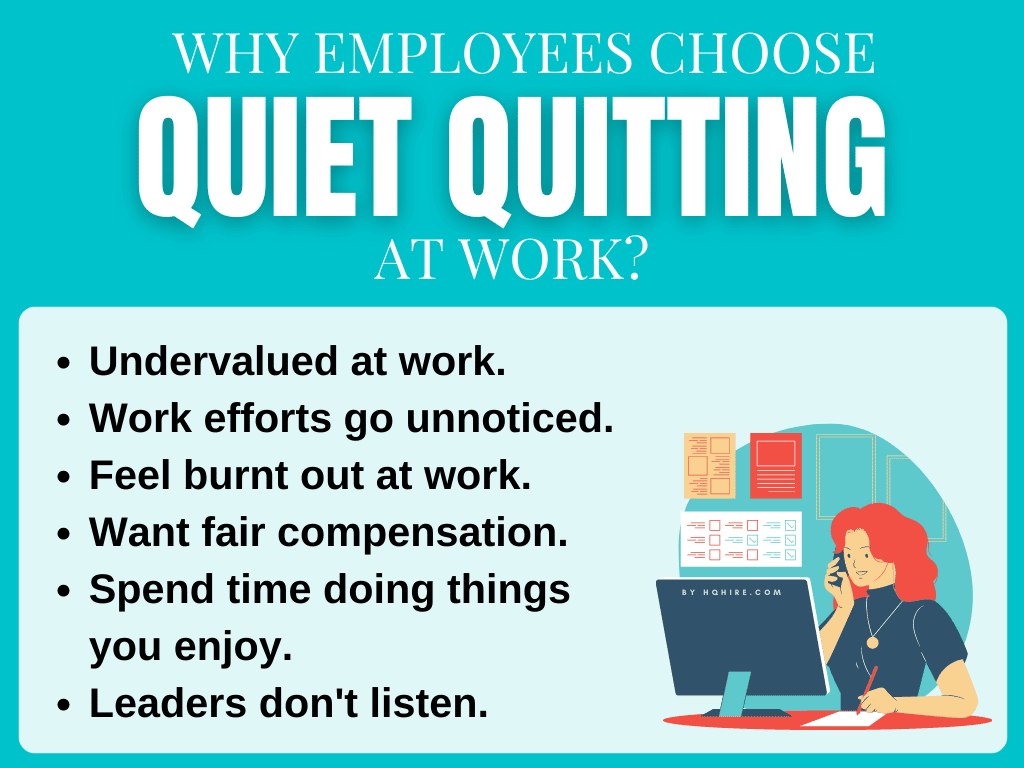Quiet quitting at work is a phenomenon that is getting more common at the workplace.
Quiet quitting a job does not refer to someone resigning from their position but rejecting the idea of going above and beyond at work.
When an employee quiet quit at work, it refers to the idea of doing the job you are paid for and living your personal life once you are off work.
8 Reasons For Quiet Quitting Your Job
Employees may choose to quiet quit their job due for many reasons, although quiet quitting your job is never encouraged, there are some valid reasons why employees choose this, and often the problem lies with the employer or the manager of the employee.
When you are thinking of quiet quitting your job, it might be better to quit your job and get a better one elsewhere.

You Are Undervalued At Work
Nothing is worse than feeling invisible and unheard at work. Everyone wants to feel valued for their work, but when your coworkers don’t acknowledge your accomplishments, you may feel like you don’t belong.
- Employees will worry about the possibilities for career progression.
- Employees will question themselves and wonder how they will advance if no one sees what they are doing.
Some employees quiet quit their jobs in an effort to get their managers to notice all the additional work that was once being done.
Your Work Efforts Go Unnoticed
Quitting quietly doesn’t begin suddenly. Often, passionate employees frequently raise issues that management acknowledges but either fails to address or downright disregards their employee’s efforts.
When this happens things will start changing in the workplace,
- Employees may choose to take action by becoming inactive if they believe their bosses are indifferent to their issues.
- Workers may eventually doubt their managers.
- Managers will eventually lose the trust of their employees
Individuals to take part in quiet quitting as they feel as though there is no point in putting in any more effort than is required since management won’t recognize it anyway.
You Feel Burnt Out At Work
Quiet quitters are usually once-passionate employees who were overwhelmed and overworked to the point of exhaustion or burnout. This increased workload is frequently caused by personnel turnover.
Burnout may also be caused by an employee taking up the slack for other team members, as well as a lack of responsibility within the group. These circumstances can also be created by an extremely competitive environment.
Employees may also feel compelled to do additional work in order to keep up with coworkers or to prove themselves.
Many workload talks are one-sided, with the employer imposing expectations and leaving little space for the employee to voice concerns or negotiate restrictions.
Whatever the rationale, the ultimate consequence is that employees have more work than they can do in the long run, with no clear end in sight and no way to reduce the task.
You Want Compensation For Your Extra Work
Many quiet quitters believe they work too hard for too little income. The true source of the problem is that employees believe they are being unfairly rewarded for their efforts. Employees, in turn, reduce their efforts.
Frequently, these team members have often sought more pay and been turned down, or they have reason to suspect that the employer would not listen to their requests.
Employees believe that their company does not properly recognize their commitment and effort when they are not compensated for working longer hours.
“When employees feel exploited and turn to methods of quiet quitting, doing what they are paid, nothing more, nothing less.”
You Want To Spend More Time Doing Things You Enjoy
The desire to spend more time doing things one enjoys is often in conflict with the amount of time required to work.
People commonly quiet quit their job to put themselves and their well-being first before the priorities of work.
“Quiet quitting is to take less time to do extra work tasks and more time to spend doing the things you enjoy.”
When an employee quiet quit their job, they can spend more time with their family, taking part in some hobbies, or just taking time for themselves.
Spending more time doing things you enjoy can be good for your work as well.
Putting your well-being first can not only increase your work output in the long term but can also increase your overall outlook on both work and life.
Your Workplace Leaders Fail to Listen
The poor communication skills of your workplace leaders can be one of the main reasons why employees are quiet quitting their job.
Communication is a two-way activity, where the leader doesn’t only give guidance but listens to feedback.
When employees are not able to give feedback or ask questions in a productive manner. Individuals will eventually choose to take part in “quiet quitting”“.
“When this communication is not heard, individuals feel as though their work efforts and personal well-being are not encouraged.”
What your leader should have done instead?
As a leader of the team, this can be resolved easily by listening to their employee and acknowledging their emotions and experiences during the communication.
A key weapon in the struggle against quiet quitting is empathy.
With empathy, employees are less inclined to take matters into their own hands and disappear into the background at work when they believe you understand them and have their best interests in mind.
“Empathy works best when it involves genuine interactions with employees.”
Active listening exercises can also help in improving communication.
Quiet Quitting Can Help You Re-establish Your Boundaries
Sometimes, a poor work-life balance and a disrespect for the boundaries between work and home life lead to quiet quitting.
For example, perhaps coworkers or bosses contact or email often after hours and anticipate an answer from the employee. Sometimes work can also interfere with vacations, or bosses reject requests for PTO.
Employees can establish boundaries and stop coworkers or supervisors from invading their personal space by quietly quitting.
What if you are a people’s manager?
As a people’s manager, you should promote the rights of your employees.
For example, the more explicit you are as a manager about your team members’ need for privacy, the less likely it is that they would overstep those boundaries.
Your Boss Gives You Unclear or Conflicting Expectations
To put it simply, quiet quitters think their employers expect too much of them. These workers believe that their bosses have unfair expectations and requirements.
- Managers continuously add duties to an employee that are not part of the job description without first consulting employees.
- An employee takes on a dual function and does the duties of two or three distinct roles instead of the post for which they were employed and anticipated.
Even though the employee may feel they are performing admirably or going above and beyond, the manager constantly pushes for more or refuses to provide constructive criticism. This can lead to the employee potentially burning out or taking part in the concept of quiet quitting.
Read Also:
Join over 11,000+ achievers who are committed to achieving their career goals!






